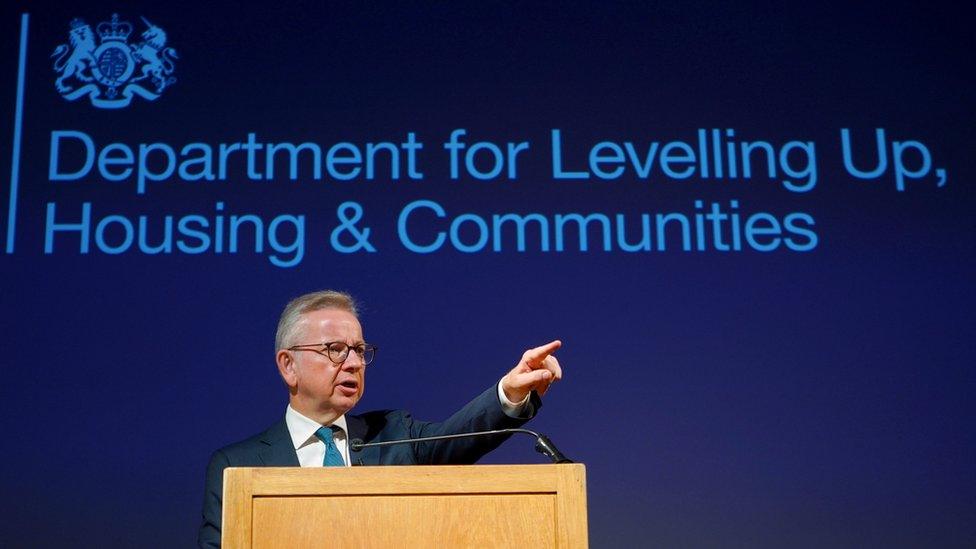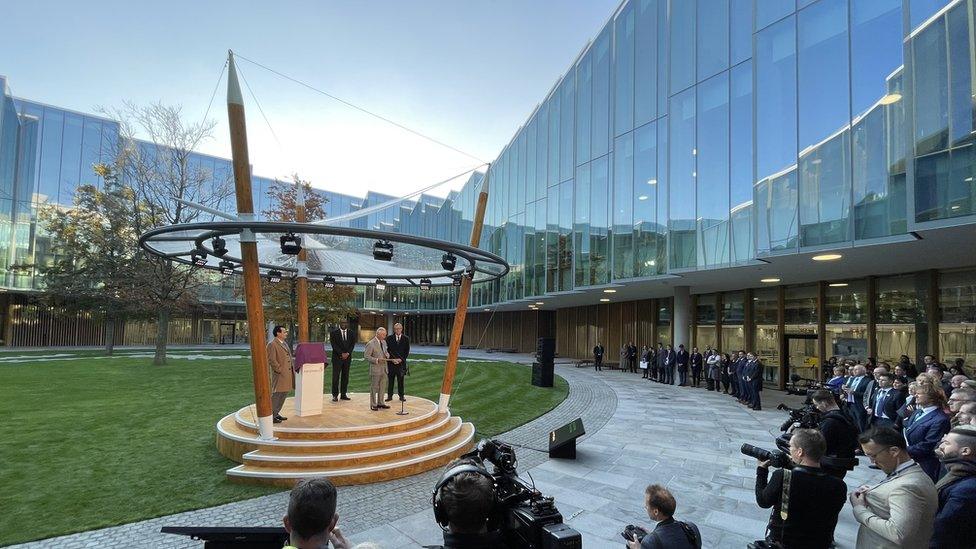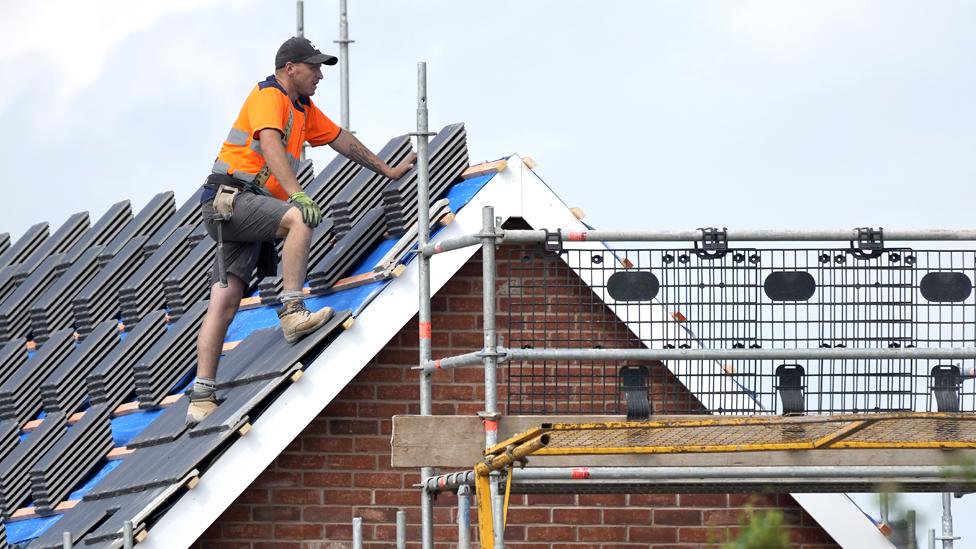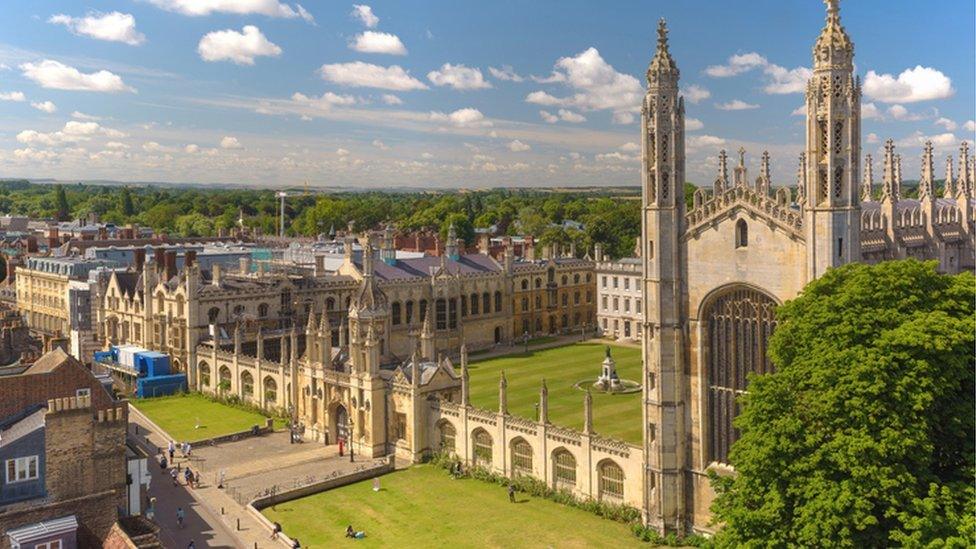Cambridge house building to be 'supercharged' - Gove
- Published

Michael Gove said Cambridge's growth was being slowed by a lack of laboratory space and new housing
The government says its housing plans include "supercharging Europe's science capital" – meaning Cambridge could see huge new development by 2040. It was recently reported that the housing secretary was drawing up proposals for the city and surrounding area that include 250,000 new homes. One local MP says he will do everything he can to "stop the government's nonsense plans". So what have we learned?
What has the housing secretary said?
Cabinet minister Michael Gove said Cambridge's growth was being limited by "a lack of new space for lab capacity and research activity" and that "constraints on new housing… have priced new graduates out of the market" and "made attracting and retaining talent harder".
He said the city compared unfavourably with Boston - the US city and region that is home to a science cluster and some of the country's leading universities, such as Harvard and MIT.
Mr Gove said that in 2021 Boston "had six million sq ft of lab space under development". But in an average year, Cambridge and Oxford "together managed just 300,000 sq ft".
"In Cambridge today, you have to wait almost a year for the next available lab space and that's no way to incubate the dynamic, technological innovators that we sorely need," said Mr Gove, who is Secretary of State for Levelling Up, Housing and Communities.
In a speech in London, he said the government would "write the next expansive chapter in Cambridge's story of scientific endeavour".
What could that mean for the city?

King Charles opened AstraZeneca's new £1bn Discovery Centre in Cambridge in 2021
A Cambridge 2040 Delivery Group was being set up to lead the development of the city, backed by £5m and led by the chairman of Homes England, Peter Freeman.
Mr Freeman would work on the "detailed vision for Cambridge's future" including what it meant for housing, businesses - including in the technology and life sciences sectors - transport, healthy living and green spaces.
The delivery group would develop a master plan, "enforce high-quality design standards", buy land, approve planning and work with developers, Mr Gove said.
The Environment Agency recently confirmed it had formally objected to five large housing developments in the south of Cambridgeshire because of fears they did not have sustainable water supplies.
A Water Scarcity Working Group would be established with the Environment Agency, water regulator Ofwat, local government and industry to try to address the issue.
There would be a £3m fund to improve the water efficiency of existing homes and commercial property in the city "to help offset demands created by new developments", Mr Gove said.
The government would work with Cambridge City Council, Anglian Water, Land Securities PLC and Homes England, to "accelerate the relocation of water treatment works in north-east Cambridge", which could unlock land for 6,000 homes and one million sq ft of commercial space.
A "super squad" of planning experts would focus on the city to "turbocharge development that contributes to our vision", backed by £500,000 of investment.
So what could Cambridge look like in 2040?
The Sunday Times previously reported that Mr Gove's department believed the wider area should see 200,000-250,000 homes built by 2040, helping it turn into an area to rival Silicon Valley in California, US.
Mr Gove did not repeat this in his speech, but said Cambridge could see "a major new quarter for the city built in a way that is in keeping with the beauty of the historic centre, one shaped by the principles of high quality design, urban beauty and human scale streetscapes".
The new quarter would have "a high proportion of affordable homes" with some set aside for key workers and young academics.
It would connect to the rest of the city "with a sustainable transport network that sees current congestion becoming a thing of the past".
Mr Gove also promised "a substantial new green space that rivals… the best urban parks in the world" alongside "new centres for culture".
"In the wider region, we could support some of our most remarkable net nature reserves such as Wicken Fen, with what could become a new National Park," he said.
What has been the reaction to the plans?
Anthony Browne said housing growth in Cambridgeshire needed to be done in a "sustainable way"
Anthony Browne, the Conservative MP for South Cambridgeshire, Tweeted shortly before Mr Gove's speech, external that he "will do everything I can to stop the government's nonsense plans to impose mass housebuilding on Cambridge".
He pointed to the Environment Agency's objections to new development and said "we have quite literally run out of water. Our streams, rivers and ponds already run dry".
Mike Davey, the Labour leader of Cambridge City Council, welcomed the commitment to tackle water scarcity, but said he wanted more detail about the plans overall.
"Anyone who's serious about wanting to enhance this city, we are keen to talk to," he said. "That must include central government because Cambridge is part of the national regeneration, not just local.
"It would have been useful to have more detailed and enhanced conversations before this. The reason we have a housing crisis is because of central government's inability to meet their own targets."
Pippa Heylings, the Liberal Democrats' parliamentary candidate in South Cambridgeshire, said the plans "risk killing the goose that lays the golden eggs by racing in and overheating what is already one of the fastest growing areas in the country".
"They are taking local people for granted once again. They are taking away local democratic accountability and replacing it with decrees from on high in Whitehall. They can't be trusted with the future of our area," she said.

Find BBC News: East of England on Facebook, external and Instagram, external. Got a story? Email eastofenglandnews@bbc.co.uk or get in touch via WhatsApp on 0800 169 1830
Related topics
- Published25 July 2023

- Published10 July 2023
